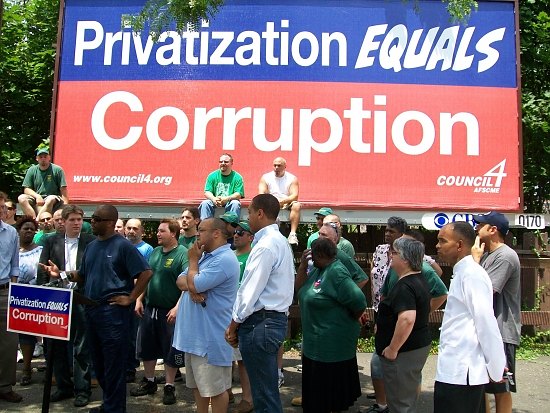
By GREGORY. HEIRES
Small government advocates tout privatization as a way to reduce costs and improve services in the public sector.
But around the country, the privatization of state and local government services has a shoddy track
record.
Governments started turning over public services to the private sector in the 1970s as they searched for ways to cut costs and conservatives stepped up their effort to move the country to the right by pushing for lower taxes and a reduction in public services. Free-market advocates, such as the Koch brothers, the American Legislative Exchange Council and the Cato Institute, promote privatization through reports and conferences. And conservatives back political candidates sympathetic to privatization.
Each year, an estimated $1 trillion of $6 trillion in federal, state and local government spending goes to private companies, according to In The Public Interest, a public policy think tank. Taxpayer dollars fund for-profit prisons, water management companies, food services, charter schools, information technology companies, parking lot and parking meter management, parks maintenance—you name it.
But in many instances, privatization has resulted in corruption and union busting, and it has jeopardized public safety and harmed the environment. Profit-seeking companies make a killing while pushing down wages and delivering poorer services.
One of the most publicized privatization fiascos occurred in Chicago.
In 2008, the city decided to lease the city’s 36,000 parking meters for $1 billion Morgan Stanley-led private consortium. Later, an inspector general’s report found Chicago could have received $974 million more for the 75-year lease.
“Too often, these companies make business decisions that pad their bottom line, but harm users of the services as well as broader communities,” according to “Cutting Corners: How Government Contractors Harm the Public in Pursuit of Profit,” a report by In The Public Interest, a public policy think tank.
The report’s key findings:
• Privatization harms public services. The report discusses the failure of the privatization of school bus maintenance in St. Louis, Mo.
Because of the privatization, the report says, “the buses experienced a number of alarming problems due to underinvestment and a lack of maintenance, such as broken heaters, faulty brakes, excessive rust, doors falling off hinges and tires falling off axels.”
• Privatization often harms public employees. The practice often involves contracting out decent unionized jobs with good benefits to companies that employ lower-paid workers with fewer benefits.
For example, the contracting out of janitorial services in the Chicago schools led to the layoff of 290 janitors. Short staffing forced teachers to take on the chore of cleaning up filthy classrooms and bathrooms. Overflowing garbage cans attracted cockroaches, mice and bugs.
• Privatization harms the broader public as well.
U.S. Investigation Services, contracted by the federal United States Office of Personal Management, botched security clearance checks. In 2007, despite his arrest record, ISIS cleared Aaron Alexis, the military contractor who later shot and killed 12 people at the Navy Yard in Washington, D.C.
• By cutting corners, contractors also harm the environment. A federal Court fined Duke Energy for $102 million because its shoddy pipeline maintenance caused 82,000 tons of coal ash to spill into the Dan River in North Carolina.
State and local governments are taking a more serious look at privatization before deciding to turn over services to the private sector.
New York City, for example, assigned its own employees to take over its automated payroll system, known as CityTime, after costs rose to $700 million from the $63 million originally budgeted. Eleven contractors were convicted on charges of defrauding the city and receiving kickbacks after U.S. Attorney Preet Bharara indicted them for siphoning off millions from the project in a money-laundering scheme.
In 2009, Gov. Mitch Daniels canceled a $1.3 billion contract with IBM because of its failure to provide welfare services to the state’s neediest families.
In New Mexico, a 14-year experiment promoted by the Cato Institute to put the management of public land under the control of a private trust failed. The National Park Service took over the 89,000-acre Valdes Caldera National Preserve because the trust failed to meet its mandate to make the preserve “financially self-sufficient” by 2015.
What should state and local governments do to ensure they don’t get ripped off?
The report says contract proposals should guarantee that contracting out leads to efficiency rather than service and personnel cuts.
Other recommendations include assessing contractors’ track records, better monitoring, and flexibility in canceling contracts.
These steps are good government practices that would help cities like Chicago and New York and states like Indiana and New Mexico avoid the perils of privatization.

